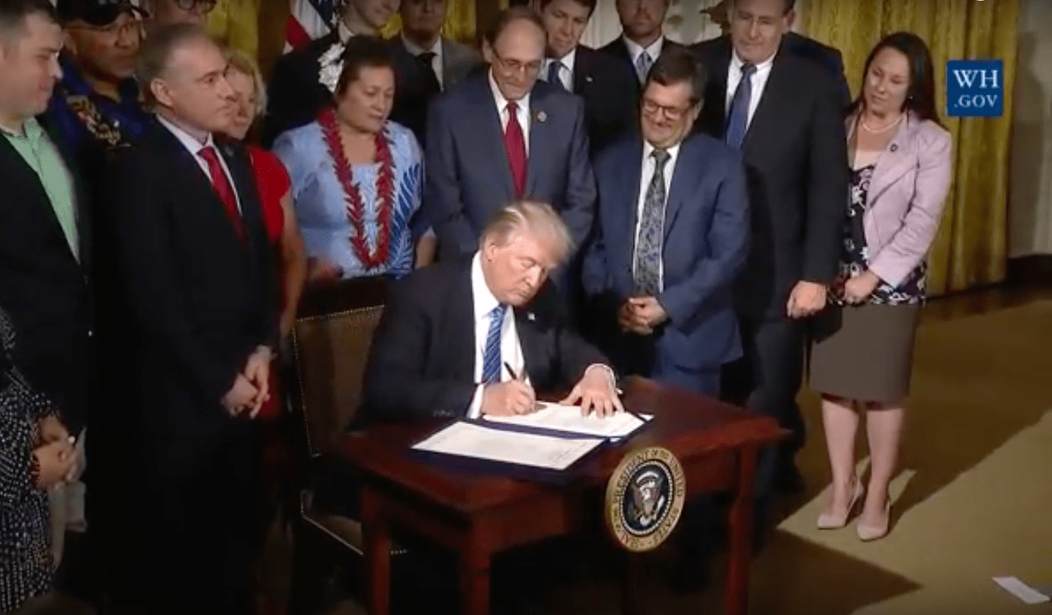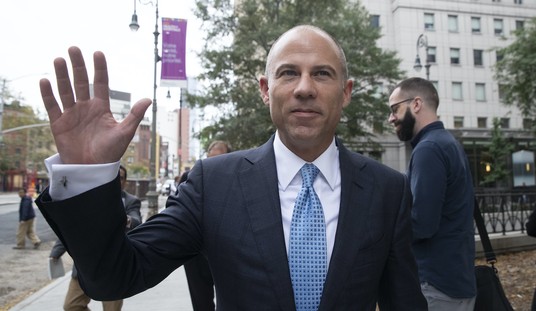On Friday, President Donald Trump signed the Department of Veterans Affairs (VA) Accountability and Whistleblower Protection Act of 2017, which empowers VA Secretary David Shulkin to fire bad employees. Following years of scandals, this bill is a victory for taxpayers and veterans alike, but it is only the first step toward real reform, at the VA and in the federal government generally.
“For many years the government failed to keep its promises,” Trump declared before signing the bill. “Veterans were put on secret wait lists, given the wrong medication, given the bad treatments, and ignored in moments of crisis for them. Many veterans died waiting for a simple doctor’s appointment.” But “outdated laws kept the government from holding those who failed our veterans accountable.”
Trump characterized the bill as “one of the largest reforms to the VA in its history. It’s a reform that I campaigned on and now I am thrilled to sign that promise into law.”
The bill empowers VA Secretary David Shulkin to remove bad employees, but the president insisted that “we want to reward, cherish, and promote the many dedicated employees at the VA.” The law also allows Shulkin to hire more medical directors at VA hospitals.
Trump also declared, “believe me, we’re just getting started.”
The bipartisan bill passed the House of Representatives last week by a vote of 368-55, and it passed the Senate by voice vote.
Both Shulkin and Trump praised Michael Verardo, a retired Army sergeant who lost his left leg after stepping on an explosive device in Afghanistan in 2010. At the signing, Verardo said he was prepared to risk his life for his country, but “what I was not prepared for was coming home to a broken VA system.”
After 110 surgeries, Verardo faced long delays and administrative struggles. He recalled waiting 57 days to get his prosthetic leg fixed, making a three-hour round trip so the VA “could check to see that I still had my serious injuries,” and a three0and-a-half-year wait “for required adaptive changes to be made so I could safely reside in my own home.”
“Under President Trump, those changes were made in weeks,” Verardo added.
After Verardo’s remarks, Secretary Shulkin explained the importance of reforming the firing process. “There’s nothing more demoralizing … than when the VA is forced to take employees back who have deviated from those values,” the secretary said.
The secretary insisted that reform will not stop with this law. He mentioned 13 risks that the VA faces in the future. But “we won’t be able to accomplish any of the reforms at the VA if we don’t have the right people in place.”
Recent scandals confirmed the importance of this reform. In April, a VA employee was caught watching porn on the job, and Shulkin was not able to fire him immediately. In 2016, the Merit Systems Protection Board (MSPB) prevented the firing — and even the demotion — of two VA directors who abused their authority to pocket more than $400,000 in moving costs, which they never repaid.
One of the most egregious cases is that of Sharon Helman, former director of the VA hospital in Phoenix, Ariz. and a convicted felon. After being fired in 2014, Helman sued to get her job back, and in May a federal court ruled her firing unconstitutional. “She knows that the VA’s personnel policies are so convoluted that she could have her determination at least temporarily overturned,” Dan Caldwell, policy director at Concerned Veterans for America (CVA), told PJ Media.
Because the lack of accountability is such a widespread and damaging problem at the VA, “it has to be a first reform before you start talking health care reform for the VA,” Caldwell argued. If the bill Trump signed solves the accountability issue at the VA, not only should other agencies get similar reforms, but Congress and the administration can focus on fixing the health care issues veterans still face.
While the bill Trump signed into law will prevent cases like Helman’s, Caldwell insisted that this bill is just the first step in the important work of reform. “Across the federal government, you have some of the same problems that you have at the VA,” Caldwell told PJ Media.
“At the VA, they are particularly acute and particularly urgent because of the threat that it’s posing to the health and well-being of our nation’s heroes,” the CVA director said. He argued that the VA’s disciplinary process is so “convoluted” because it was devised “in collusion with the government unions.”
“If this law works well, they should look at scaling it to other parts of the federal government where it makes sense,” Caldwell suggested.
He also shot back at government unions like the American Federation of Government Employees (AFGE) which attacked the VA reform bill as the “you’re fired” bill, claiming that it allows political appointees to fire employees “at will.”
“This does not dismantle protections for VA employees, and it does not make them at-will employees, as the unions have dishonestly implied and said outright,” Caldwell declared. “You still have to have cause to fire, there’s still an appeals process, and there’s still oversight from Congress.” In fact, a large section of the bill exempts whistleblowers from expedited firing.
Caldwell denounced the unions’ attacks as “completely false,” and “detached from reality,” explaining that government unions like the AFGE “have a vested interest in preserving the status quo because they benefit from it.” According to a report this January, VA employees worked over 1 million hours for unions on the taxpayers’ dime in 2015.
The harrowing story of Michael Verardo, the amputee who waited over three years for adaptations to his home, underscored just how important this law really is. Shulkin praised Trump, not just for signing the law, but also for spurring the VA on to achieve its goals.
Under President Obama, Verardo waited three years for safety adaptations. Under President Trump, “he is waiting no longer,” Shulkin proudly declared. More reforms are necessary, but under President Trump, the VA may finally treat veterans with the care and honor they deserve. It’s about time.
Click “Load More” to see the video of Trump’s remarks.








Join the conversation as a VIP Member